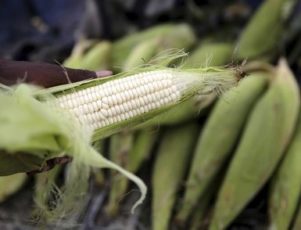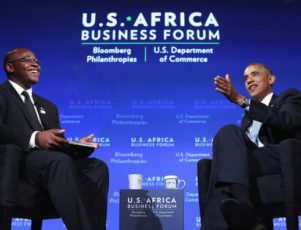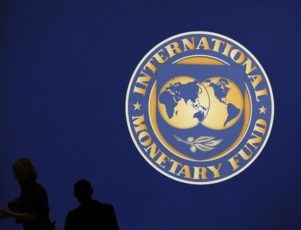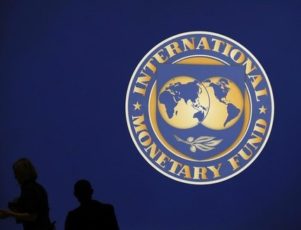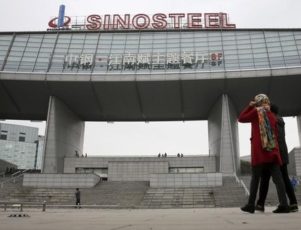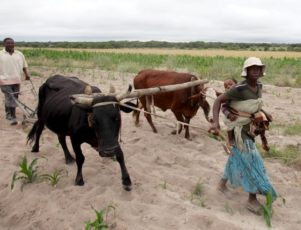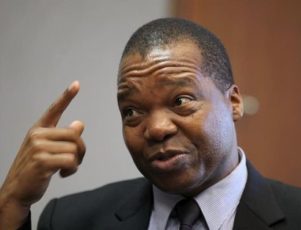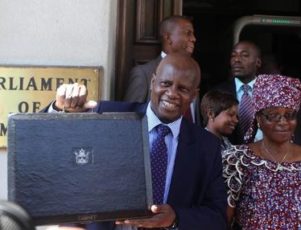HARARE (Reuters) – Zimbabwe’s plan to win back international funding by paying compensation to white farmers forced off their land faces a major snag: the black farmers expected to stump up the cash say they don’t have it.
The new occupants working the land, many of who had few farming skills when they were resettled, say they can barely make ends meet, let alone pay an extra levy.
Their agricultural output is a fraction of the level seen before 2000, when President Robert Mugabe – saying he sought to correct colonial injustices – introduced land reforms which led to thousands of experienced white farmers being evicted.
They are also being hammered by Zimbabwe’s worst drought in a quarter of a century and toiling under a stagnating economy that has seen banks reluctant to lend and cheaper food imports from the likes of South Africa undermining their businesses.
“Are farmers able to pay? I will say no. Is the land being productive? I will say no again,” said Victor Matemadanda, secretary general of a group representing war veterans who led the land seizure drive in 2000 and are now farmers.
He told Reuters that many farmers could not even meet water and electricity bills and that it was the government’s obligation – not theirs – to pay the compensation.
Zimbabwe Commercial Farmers Union President Abdul Nyathi also said his members would not be able to pay compensation. “Most of the farmers face viability issues, the government will have to look at other ways of raising money,” he added.
Mugabe’s land reforms have led to about 5,000 white farmers being evicted from their land by his supporters and war veterans over the past 16 years, often violently. More than a dozen farmers have been killed.
The land seizures, along with allegations of vote-rigging and rights abuses – all denied by Mugabe – led to Zimbabwe being targeted by sanctions from Western donors. This compounded the economic plight of the country, which saw financing from the International Monetary Fund, World Bank and African Development Bank frozen in 1999 after it defaulted on debts.
The IMF’s head of mission to Zimbabwe, Domenico Fanizza, said this month that improving fiscal discipline and re-engaging the international community should be priorities for Harare. He said this would “reduce the perceived country risk premium and unlock affordable financing for the government and private sector”.
DIVIDED OPINION
In an attempt to woo back international donors and lenders, Finance Minister Patrick Chinamasa announced a package of major reforms on March 9, including the farm measure and a big reduction in public-sector wages. He said it had the full backing of Mugabe.
The farm plan involves 300,000 families resettled on seized land paying an annual rent – based on the size of their farms – towards a compensation fund for those evicted.
If they are unable to pay, however, it could be a major setback for the government’s plans to shore up an economy that is stagnating after a deep recession in the decade to 2008, which slashed its output by nearly half, drove hundreds of thousands abroad in search of better paying jobs and has left the jobless rate at around 85 percent.
The finance ministry did not respond to repeated requests for comment about the ability of farmers to pay the levy.
Reserve Bank of Zimbabwe governor John Mangudya told Reuters that the farmers’ situation should improve once the government grants them 99-year leases on their land, which he said would make it easier for them to secure financing from banks and to pay rent towards the compensation fund.
All agricultural land in Zimbabwe is owned by the government and, at present, farmers have no legal claim on their farms – which they say has made banks reluctant to extend loans to buy fertilisers, seed and chemicals so they can raise output. But the government says it will imminently grant the leases.
“We are saying that the land should produce, but we also know what the constraints are to increase production,” said Mangudya. “That is why we need to finalise on the 99-year land lease agreements to make them bankable so that farmers have security of tenure. With that there is no reason why farmers should not be able to pay (rent).”
Mugabe’s land reform programme is a highly emotive issue, which has divided public opinion. Supporters say it has empowered blacks while opponents see it as a partisan process that left Zimbabwe struggling to feed itself.
“The land revolution was a necessity and if the economy was running very well farmers would be able to pay the rent,” said Matemadanda of the war veterans’ group. “The prevailing economic conditions do not allow.”
The land seizures have led to a steep fall in commercial agriculture output; yields for the staple maize have fallen to an average 0.5 tonnes percent per hectare from 8 tonnes in 2000 when white farmers worked the land.
Mugabe acknowledged the skills of evicted white farmers last week, saying they had helped neighbouring Zambia to produce excess maize, which Zimbabwe was now importing.
ELECTIONS
A treasury ministry circular said that compensation would be paid out of rent from black farmers who benefited from the seizures. Chinamasa has not said when farmers would be expected to start paying the rents, or at what level they would be set.
When announcing the measures, he said production on black-owned farms was “scandalously low” and that the economy was under siege from the drought.
The white Zimbabweans who accounted for the majority of those evicted will be compensated only for the improvements they made to the farms, while the foreign owners forced out will be paid full compensation for land and improvements, under the plan.
Chinamasa said Harare broke bilateral investment agreements with other countries when it seized farms owned by foreigners.
Tony Hawkins, professor of business studies at the University of Zimbabwe, said the government was “going through the motions to keep the IMF happy”.
“They probably want the international community to see that they are doing something,” he said. “I doubt they will press with this ahead of the elections,” he added, referring to the 2018 general election. Farmers are an important voting block for Mugabe’s ruling ZANU-PF party.
Hundreds of evicted white Zimbabwean farmers are now farming in Zambia, Mozambique, Malawi and Nigeria, while others migrated to Europe, New Zealand and Australia.
Hendrik Olivier, director at the formerly white-dominated Commercial Farmers Union (CFU), said the government had not yet approached evicted farmers to discuss compensation, and also cast doubt on the plan’s viability.
The CFU, which once boasted 4,500 farmers who produced 90 percent of Zimbabwe’s export crops, including tobacco and horticulture produce until 2000, now only has 300 members.
“It’s a huge step forward, lets acknowledge that. In the past the government has said that it won’t pay compensation,” Olivier told Reuters.
“But if you are talking about new farmers paying a levy, that’s not gonna work, that’s not gonna pay our compensation.”
(By MacDonald Dzirutwe. Editing by James Macharia and Pravin Char)
Read more

